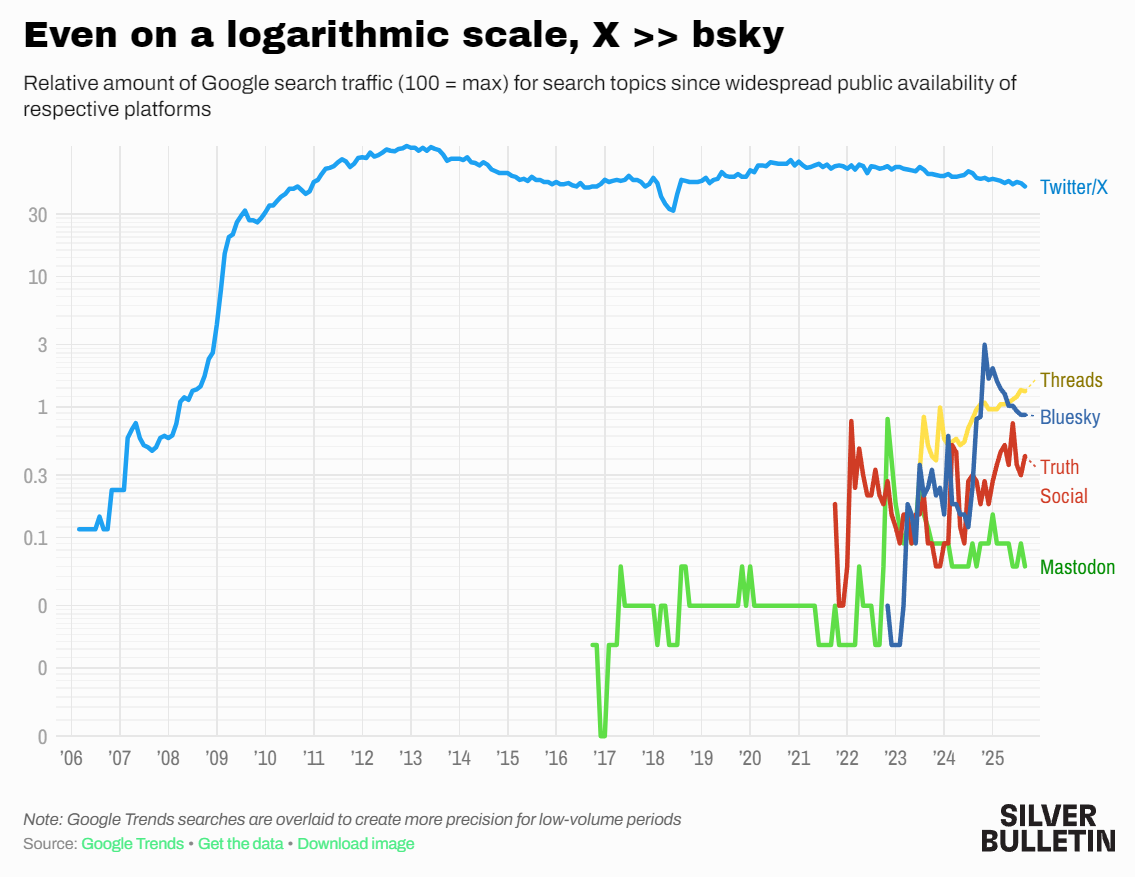The forum wars are back
Another update on the state of social - Bluesky and the return of BBS-era website tribalism
Back in the 90s and early 2000s, internet life for power users was organized around forums. Gaming forums, tech forums, car forums, each had its own quirks, rules, and vernacular. And they didn’t just exist in isolation, they often went to war with each other (then it was mostly for the lulz, not attention/dopamine or political holy wars). Entire threads were dedicated to mocking rival forums, brigading their users, or screenshotting the weirdest/funniest posts. If you lived through that era, what’s happening now with the Bluesky-Twitter/X drama should feel familiar: the forum wars are back. Everything is cyclical, nothing is new under the sun.
Nate Silver recently coined the term Blueskyism to describe the ethos that’s emerged on Bluesky, Twitter’s scrappy spinoff. His definition breaks down into three traits: smalltentism (policing the boundaries of who belongs), credentialism (overvaluing degrees or identity signifiers instead of arguments), and catastrophism (doom-scrolling as worldview). It’s not exactly left politics, he says, but a distinct tribal flavor, one that feels designed to alienate outsiders.
Max Read picks up the thread in his piece on “why are pundits obsessed with Bluesky.” He argues what we’re seeing isn’t new behavior at all, just the same “Twitterism” transplanted to a smaller, more insular stage. Bluesky users pile on the hated pundits. Said pundits gleefully screenshot “over-woke” Bluesky posts back to their own audiences. No one actually is trying to persuade the other, they’re after the endless rush of dunking on the outgroup. And both sides, consciously or not, miss each other. It’s the same dynamic that fueled Twitter dogpiles, just with more friction now that everyone’s scattered across platforms.
What gets overlooked is what happened to the users who couldn’t handle the rawness of Twitter under Elon, but didn’t migrate to Bluesky. Twitter (now X) remains closer to a pure, unfiltered forum from the 90s. Some users sought a gentler space and were convinced Bluesky would be it. In reality, Bluesky was never “gentle,” it was just a different brand of combative, wrapped in the language of safety and community, complete with its own purity tests and pile-on culture.

Where did those users actually go? Many now just post to LinkedIn. The “last safe space.” But really, LinkedIn isn’t even a forum at all, it’s a lukewarm networking event where everything is filtered through personal promotion and business smarm. It’s the HR-approved internet: congratulatory posts about promotions, anodyne thought-leadership platitudes, humblebrags in the form of “reflections.” The sharp edges of Twitter are missing, but so is the authenticity. The site is a bit like a hallway conversation at a convention center with your manager standing next to you, not the dive bar next door at 10pm.
Anyway, I’ve written about Bluesky before. At launch, it felt like a Portlandia-flavored alternative to Twitter with moderation tools that users wanted (and some objectively great features like hyperlinks not being throttled). While Threads, by contrast, was corporate slop: a mall food court for Instagram users, devoid of personality that continues to grow because Meta has billions of users to funnel to it (and suffering from the same maladies, since it’s still just text Instagram). My prediction then was Bluesky would remain a tight-knit, but at least a real internet community, and that’s exactly what’s happened.
The important thing here is that Bluesky isn’t going to die and go away, it’s maturing into what it was always going to be — a place with its own norms, memes and vernacular (I still can’t believe they ever called it a re-skeet). Not every site has to be for billions of users, but because everyone is so Silicon Valley growth-brained they forget that smaller internet communities used to be the norm. Twitter, for all its chaos, was an outlier: a single, centralized place where bloggers, politicians, founders, and shit-posters all came together. The world that could create that is now gone, so no one is going to supplant it (which is a reason I think we still need it). But what we have in these new social startups looks a lot more like the early internet, with fractured, tribal forums occasionally lobbing rhetorical grenades at each other.
So, the forum wars are back with everyone defending the place they most call home, or perhaps just picking parts from other places to discuss with their tribes of choice. And maybe that’s fine. There should be a bunch of different places online for different people, this is a bit of return to how the internet used to be. So is the advent of Substack, Beehiiv, Ghost and the many other places people publish these days. Just like we have many states in America, live in the place that’s best for you (with the internet, it could be multiple places, perhaps you contain multitudes).




Well said. This reminds me of Yancey Strickler's dark forest theory of the internet: https://www.ystrickler.com/the-dark-forest-theory-of-the-internet/
"The internet of today is a battleground. The idealism of the ‘90s web is gone. The Web 2.0 utopia — where we all lived in rounded filter bubbles of happiness —ended with the 2016 Presidential election when we learned that the tools we thought were only life-giving could be weaponized as well. The public and semi-public spaces we created to develop our identities, cultivate communities, and gain in knowledge were overtaken by forces using them to gain power of various kinds (market, political, social, and so on).
This is the atmosphere of the mainstream web today: a relentless competition for power. As this competition has grown in size and ferocity, an increasing number of the population has scurried into their dark forests to avoid the fray."
I was an absolute forum junkie back in the day and I think Discord is the closest thing we have to that kind of energy. There are even instances where someone in a sever for some niche interest gets pissed at someone else, goes and makes their own new server, factions develop, etc, just like back in the forum days. Reddit has a bit of that too but I think Discord exemplifies it even if there are things about it I don't think are as good as forums.
The thing forums had over most social media (maybe except reddit and discord) is that everyone was drawn to a forum by a common interest and no matter how angry you got at other members, you knew you all had that one interest the site was predicated on in common. Sometimes, especially in the case of fighting game forums, the interest in question helped squash beefs. Instagram, Bluesky, and X are simply too general for the good of most of the people who use them and there's little emphasis on any kind of commonality in those places which only makes division easier. So I for one hope that things go back to smaller more specialized communities.